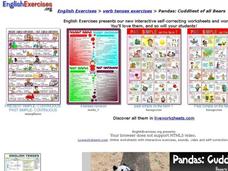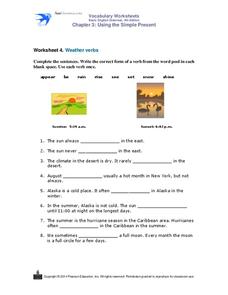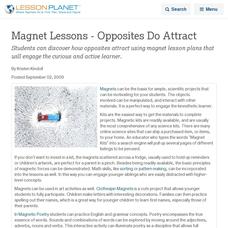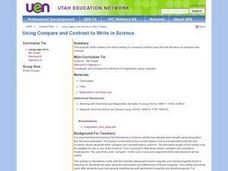Curated OER
English Exercises: Verb Tense and Pandas
In this verb tense and pandas worksheet, 6th graders read a long passage about panda and interactively select the correct word to fill in 44 blanks in the story, with immediate online feedback.
Curated OER
Weather Verbs
In this weather verbs worksheet, learners practice verb usage. Students are given eight verbs and eight sentences with the verb missing. Learners are to complete each sentence with the correct verb.
Curated OER
Maggie's Adventures Grades 1-2
Learners use Maggie's Learning Adventures online activity. They play a matching or memory game to become aware of homophones. Students recognize that there two ways to use many words. They practice with noun or verb identification by...
Jessica Winston
Tacky and the Winter Games
Helen Lester's wonderfully wacky, Tacky and the Winter Games, is the core text featured in a resource packet that includes a prediction exercise, an activity menu, vocabulary flash cards, and book review worksheet. A great way to cheer...
Curated OER
There Is/Are - Counting Stars
In this counting stars worksheet, students fill in the blanks to a passage, complete the questions, and write sentences with possessive forms. Students complete 3 activities.
Curated OER
Growing Vegetable Soup
Students use children's literature in order to think about the concept of creating a garden. This is done through conducting simple research about types of plants that could be grown in the area and how to care for them. Then the garden...
Curated OER
The Nobel Prize in Chemistry 2003 - Information for the Public
An information-packed eight-page article detailing the history of understanding active transport across cell membranes makes up the bulk of this handout. Two pages of reading comprehension and critical-thinking questions follow. The...
Curated OER
Following Instructions
Get scholars thinking about the scientific process with this fun experiment they can do at home. Learners practice reading directions as they underline each instruction in a procedural paragraph. They create a flow chart and record...
National Geographic
Spot Where You DON'T Get Your Seafood
When your class is examining the fishing industry or sustainable practices, you can use this brief activity to demonstrate the global impact our food choices have. Overharvesting, overfishing, and bycatch are important topics to address...
Curated OER
Fresh Foods from Farm to Table
Are you a good egg? Learners begin a farm-to-table lesson by acting out verbs in groups to demonstrate the egg production process, and then research the steps using online resources. Several excellent videos are linked through the...
Curated OER
Renewable Energy Sentences
Learners construct sentences using nouns and verbs from a "renewable energy" word bank. In this cross curriculum ecology and sentence structure grammar and mechanics lesson, students listen to the book Our Earth: Clean Energy by Peggy...
Curated OER
Parts of the Plants
Second graders discuss as a class what they know about plants viewing several pictures of plants as well as a tree poster. They work in groups to observe a flowering plant which is removed from a pot with the soil brushed away and is...
Curated OER
"I can move" but why?
Students analyze the movements they can do with their bones, muscles and joints. They explore, have discovery and review knowledge of movement. Students are asked to find their personal space.
Hachette Children’s Group
Our Five Senses
Show your class how to experience their world with the five sense. With worksheets on each sense, learners investigate their surroundings and categorize them into sight, smell, touch, hearing, and taste.
Curated OER
Magnet Lessons - Opposites Do Attract
Students can discover how opposites attract using magnet lesson plans that will engage the curious and active learner.
Curated OER
Creative Problem Solving
Students respond to a situation presented about the wetlands. In this wetlands lesson, students understand the various opinions over the use of areas in the wetlands. Students complete a worksheet using critical thinking questions about...
Curated OER
The Art of Adaptation
Students examine and discuss animal adaptation. They read an article about snakes, conduct research on ways animals adapt, develop a diagram, and write a short story written from the perspective of the animal they researched.
Curated OER
Using Compare and Contrast to Write in Science
Fifth graders investigate and compare the behavior of magnetism using magnets. In this physics lesson, 5th graders write about the similarities and differences of a variety of magnet types.
Curated OER
Incandescent Light Bulb
Students study the history of the light bulb and how an incandescent light bulb works. In this electricity lesson plan students complete several experiments on the light bulb.
Curated OER
Getting Animated
Students create a simple animation illustrating a chemical element in the periodic table. In this chemistry lesson plan, students create a new way to describe elements by using them in an artistic form.
Curated OER
American Robin: Territory Study
Young scholars read the article, American Robins: Territory Study, discussing the vocabulary, underlining key words, and taking notes. They write journal entries, and develop various writer's workshop assignments.





















